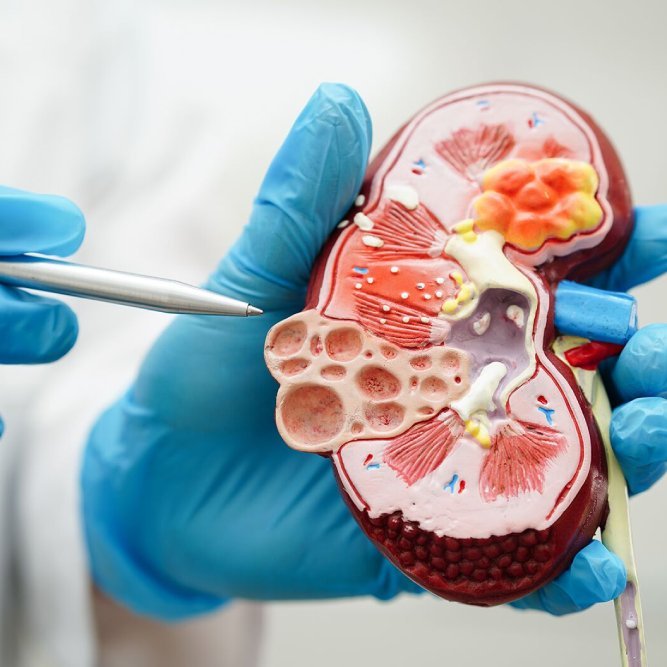Kidney Diseases

what is Kidney Diseases
Types of Kidney Diseases
Kidney diseases are classified based on the cause and the extent of damage. Some of the most common types include:
Chronic Kidney Disease (CKD):
A long-term condition where the kidneys gradually lose function over months or years. It is often caused by conditions like high blood pressure, diabetes, and heart disease. Early stages may show no symptoms, making regular checkups essential for early detection.Acute Kidney Injury (AKI):
A sudden, severe decrease in kidney function, often caused by conditions like dehydration, infections, medications, or trauma. AKI can be reversible with prompt treatment.Polycystic Kidney Disease (PKD):
A genetic disorder in which numerous cysts form in the kidneys, leading to kidney enlargement and potential kidney failure over time.Kidney Stones:
Hard deposits of minerals and salts that form in the kidneys and can cause intense pain, blockages, and even kidney damage if left untreated.Glomerulonephritis:
Inflammation of the glomeruli (tiny filtering units in the kidneys), which can result from infections, autoimmune diseases, or other conditions, leading to kidney damage.Urinary Tract Infections (UTIs) Leading to Kidney Infections:
If left untreated, UTIs can spread to the kidneys, causing pyelonephritis, which can cause scarring and affect kidney function.Nephrotic Syndrome:
A condition characterized by the leakage of large amounts of protein into the urine, leading to swelling, low protein levels in the blood, and high cholesterol.Kidney Cancer:
Malignant tumors or cancerous cells in the kidneys that can spread to other organs. Early-stage kidney cancer may not cause symptoms, making early screening vital.
Symptoms of Kidney Disease
Kidney diseases often develop slowly and may not show symptoms until significant damage has occurred. Common symptoms include:
Swelling in the ankles, feet, or face
Fatigue and weakness
Decreased urine output or changes in urination patterns (foamy, dark, or blood-tinged urine)
Persistent pain in the lower back or sides
High blood pressure
Shortness of breath
Nausea and vomiting
Loss of appetite
Itchy skin
Anemia (feeling tired or weak due to low red blood cells)
Diagnosis of Kidney Diseases
Diagnosis typically involves a combination of medical history, physical exams, laboratory tests, and imaging studies. Common diagnostic methods include:
Blood Tests (e.g., Serum Creatinine and Blood Urea Nitrogen – BUN):
These tests measure the levels of waste products in the blood, which can indicate kidney function.Urine Tests (Urinalysis):
Used to detect abnormalities like protein, blood, or infection markers in the urine.Ultrasound or CT Scan:
Imaging tests to check for kidney structure, kidney stones, cysts, tumors, or other abnormalities.Kidney Biopsy:
A small sample of kidney tissue is taken for analysis to determine the cause of kidney problems, such as glomerulonephritis or kidney cancer.Glomerular Filtration Rate (GFR):
This test measures the rate at which the kidneys filter blood, helping to assess kidney function.
Treatment of Kidney Diseases
The treatment for kidney disease depends on the type, severity, and cause of the condition. Common treatments include:
Lifestyle Changes:
Adopting a kidney-friendly diet (low salt, low protein, and adequate hydration)
Exercise and weight management to reduce risk factors such as diabetes and high blood pressure
Quitting smoking and limiting alcohol consumption
Medications:
Blood pressure medications (e.g., ACE inhibitors or ARBs)
Diuretics for fluid management
Medications to control blood sugar (for diabetes-related kidney damage)
Cholesterol-lowering drugs
Immunosuppressive drugs (for autoimmune kidney diseases like glomerulonephritis)
Dialysis:
A treatment that removes waste and excess fluids from the blood when the kidneys can no longer perform this function. Dialysis can be done in two ways: hemodialysis (via a machine) or peritoneal dialysis (using the lining of the abdomen).Kidney Transplant:
When kidney failure occurs, a kidney transplant may be the only option. A donor kidney is surgically placed into the patient’s body to restore function. Transplants require lifelong immune-suppressing medications to prevent rejection.Surgical Interventions:
Removal of kidney stones
Surgery for kidney cancer
Repair of structural issues like blocked arteries or damaged kidney tissue
